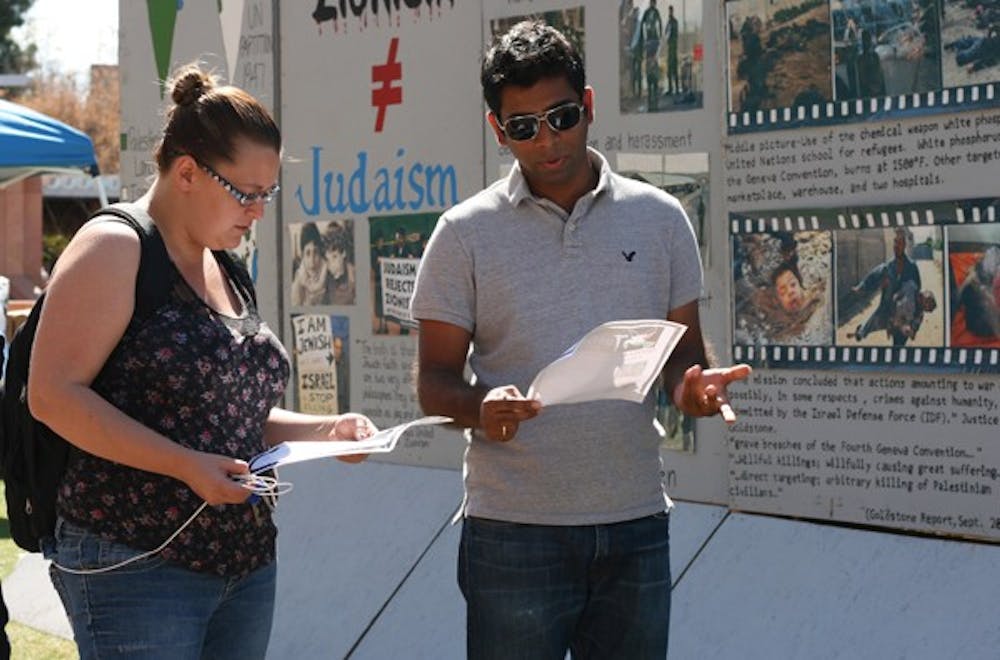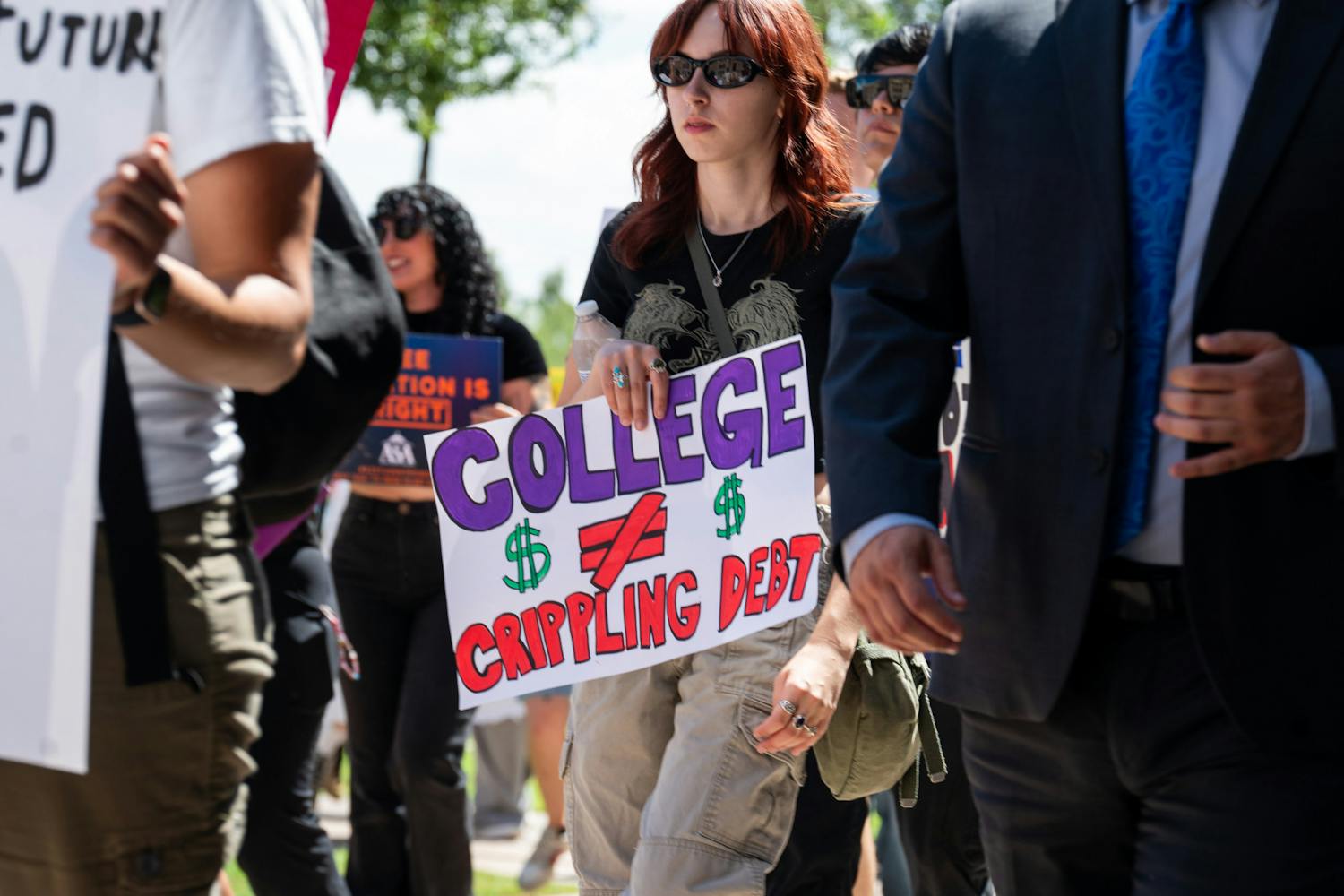 Biomedical engineering graduate student Chetan Patel, a member of Students for Justice in Palestine, talks to sociology major Sarah Elliott about what he calls apartheid in Palestine. Elliott said she thinks it's good to hear different perspectives about the situation. (Photo by Perla Farias)
Biomedical engineering graduate student Chetan Patel, a member of Students for Justice in Palestine, talks to sociology major Sarah Elliott about what he calls apartheid in Palestine. Elliott said she thinks it's good to hear different perspectives about the situation. (Photo by Perla Farias)A mock wall filled with numbers, quotes and drawings stood on Hayden Lawn at the Tempe campus Monday to represent the barrier between Israel and the West Bank. Members of the ASU chapter of Students for Justice in Palestine explained to passers-by the history of the conflict and the reasons they believe Israel is an apartheid state.
The event is part of the Ninth Annual Israeli Apartheid Week, a global initiative that aims to mainstream the idea that Israel is an apartheid state and that its actions should be denounced around the world, said biomedical engineering sophomore Aman Aberra, the president of SJP.
The student-led SJP will screen the film “Roadmap to Apartheid” on Tuesday and host a lecture by Palestinian activist Zahi Damuni on Wednesday. Aberra said the movie will help construct an analogy between the South African and Israeli apartheids.
“Nobody’s saying they are the same thing, but recognizing the parallels is useful in understanding what’s going on,” he said. “The movie shows how strong those parallels are.”
Aberra said Damuni’s lecture on Zionism will complement the idea of Israel as an apartheid state. Damuni is the co-founder of Al-Awda, The Palestinian Right to Return Coalition, a non-partisan organization that looks to restitute the rights of all Palestinian refugees to return to their lands of origins.
“(Apartheid Week) makes it clear to people that this exists, and we should be active against it the same way we were active against South Africa,” Aberra said. “Then, the status quo was to oppose the apartheid.”
Many members of SJP and alumni showed up to volunteer at the wall and will be present for the other events.
ASU alumna Hanin Bearat volunteered to give tours of the wall. She was a member of SJP through her college career, and she said people’s reactions to the wall have changed over time.
“People are very open-minded,” she said. “Over the years, I’ve noticed that that’s changed a lot. People used to be hostile, but now they’ve become a lot more receptive.”
Zachary Rabinowitz, who plans to attend ASU next semester, saw the mock wall for the first time Monday. He said he would like to join Sun Devils for Israel once he becomes a student.
“People who have not been there personally don’t understand that Israel has been very adamant about giving Arabs land … and all they do is use it to launch airstrikes into Israel and attack innocent civilians,” he said.
Rabinowitz goes to Israel frequently to visit family members and said he feels the facts of the wall were not completely fair.
“If you want to talk about U.N. resolutions, how about rocket attacks against civilians in Tel Aviv?” he said. “Anybody can read a newspaper and have an opinion, but until you’re there, you can’t know.”
A portion of the wall called "U.N. Resolutions violated by ‘Israel’” includes ending the occupation of Palestinian territory, withdrawing Israeli troops from Palestinian cities and releasing Palestinian prisoners and detainees.
“Of course there have been innocent civilian casualties of Arabs, but it’s because people like Hamas or other terror groups hide between civilians,” he said. “It’s an unfortunate tactic that they use.”
Speech and hearing science junior Yesmeen Samad, who has been a member of SJP for more than a year, said she has a personal connection to the strife because her family is Palestinian, but she is also concerned about anything that has to do with human rights.
The feedback from students who looked at the wall was mostly positive, Samad said. During the day, the wall attracted around three counter-protesters who gave out fliers supporting Israel.
“Just like we’re interested in showing our views on it, everybody has a right to express themselves,” she said.
Exploratory freshman Angel Garcia took a tour of the mock wall, because he has always been interested in the conflict. He said he believes it is possible for Israelis and Palestinians to live in one state.
The most important fact the wall points out is the division of the land, Garcia said.
“Listening to one side over the other wouldn’t do justice to either side,” he said. “Why not just make it one state? The holy land was holy to both Judaism and Islam.”
Chemical engineering junior and SJP member Dagan Sassarini said the wall is a good visual representation of the history of the conflict, because it includes both religious and historical aspects.
The wall provides an international perspective of Israel and gives insight into the difference between Zionism and Judaism, Sassarini said.
“Most Orthodox Jews don’t necessarily agree with Zionism,” he said. “It’s important to remember that it is a holy war in a sense, but to me, it represents a colonial war.”
Generally, Judaism is viewed as the Jewish faith while Zionism is a political doctrine and philosophy that believes Zion is the rightful possession of the Jewish people.
Sassarini said it is important that Americans are aware of the situation, because the U.S. government supports Israel.
“I feel as a tax-payer and a U.S. citizen, I should be interested on what’s going on,” he said. “I’m in SJP, and I have no religious affiliations. I feel like this is an accurate representation.”
Sun Devils for Israel President Melissa Rauch said SDI does not support any protests against the mock wall.
“(Apartheid Week) constitutes freedom of speech, so they can do whatever they choose, but obviously we don’t agree that Israel is an apartheid state,” she said.
SDI will host Israel Peace Week next month as a way to show its support for Israel and explain what the country has done for the U.S.
“(The mock wall) has not been updated in a long time, which just really shows that it’s not accurate,” Rauch said. “(For) the last four years, it’s been the exact same numbers and information, and they have always been inaccurate.”
Chemical engineering sophomore Ibrahim Halloum, treasurer of SJP, said the wall has been set up in a way that does not need to be updated frequently. The area of the wall that lists the death toll was updated last year, he added.
The wall states that 6,537 Palestinians have died, including 1,471 children, while only 1,092 Israelis and 125 Israeli children have been killed.
Reach the reporter at dpbaltaz@asu.edu or follow her @dpalomabp




